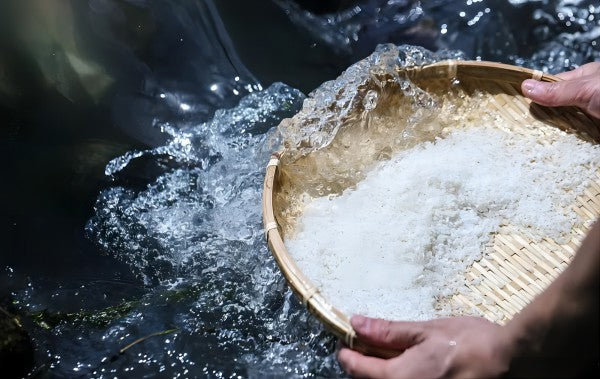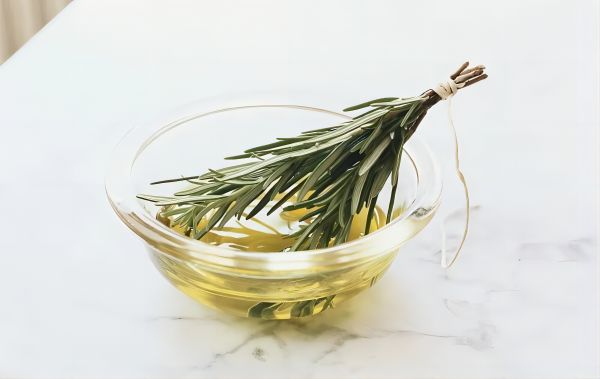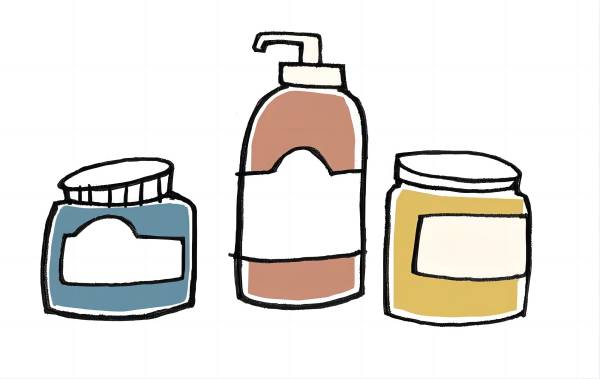If you've been on the hunt for a natural hair care remedy that won't break the bank, then you're in luck because today, we're talking all about rice water for hair! Yep, you heard me right – that humble kitchen staple can work wonders for your locks.
The Science Behind Rice Water for Hair: Understanding Its Benefits
Rice water isn't just some old wives' tale – there's real science behind its hair-enhancing properties.
Inositol Release: When rice is soaked in water, it releases a starchy substance called inositol. Inositol is a carbohydrate compound that belongs to the vitamin B complex group. It's often referred to as vitamin B8. This compound has been studied for its potential benefits in promoting hair health. Inositol is believed to have a protective effect on hair follicles, helping to strengthen them and reduce breakage. It may also play a role in maintaining the moisture balance of the hair, preventing dryness and brittleness.
Vitamins and Minerals: Apart from inositol, rice water contains various vitamins and minerals that are beneficial for hair health. These include vitamin E, which is known for its antioxidant properties. Antioxidants help protect the hair and scalp from damage caused by free radicals, environmental stressors, and UV radiation. Additionally, rice water contains minerals such as magnesium, potassium, and zinc, which are essential for maintaining a healthy scalp environment and supporting hair growth.
Penetration into Hair Shaft: Inositol can penetrate the hair shaft, which is the outer layer of the hair. This penetration allows inositol to exert its effects directly on the hair structure, rather than just sitting on the surface. By penetrating the hair shaft, inositol can help repair damage, strengthen the hair, and improve its overall condition. This can result in hair that is smoother, shinier, and more resilient to damage from styling, heat, and environmental factors.
Repairing Damaged Hair: Inositol has been shown to have reparative properties when applied to the hair. It can help repair damage caused by heat styling, chemical treatments, and environmental factors. By strengthening the hair shaft and filling in gaps in the hair cuticle, inositol can make the hair appear smoother and less prone to breakage. Over time, this can lead to healthier, more resilient hair that is less prone to split ends and breakage.
Scalp Nourishment and Hair Growth: In addition to its benefits for the hair shaft, rice water also provides nourishment to the scalp. The vitamins and minerals present in rice water help to nourish the scalp tissues, supporting a healthy environment for hair growth. Vitamin E, in particular, has been shown to improve blood circulation to the scalp, which can stimulate hair follicles and promote hair growth. Antioxidants present in rice water also help protect the scalp from damage and inflammation, which can inhibit hair growth.
Step-by-Step Guide: How to Make Rice Water
Now, let's get down to the nitty-gritty – how exactly do you make rice water for your hair? It's quite simple.
Ingredients:
- 1/2 cup of uncooked rice (any type will do, but some swear by jasmine or basmati for extra fragrant goodness)
- Water
- A jar or bowl
Soaking the Rice: Once the rice is rinsed, transfer it to a clean bowl or container. Add enough water to fully submerge the rice, ensuring that there is ample water for the soaking process. The ratio of rice to water can vary, but a general guideline is to use approximately 1/2 cup of rice for every 2 cups of water. Allow the rice to soak in the water for about 15 to 30 minutes. During this time, the water will become cloudy as the nutrients from the rice leach out into the water.
Straining the Rice: After the rice has soaked for the desired amount of time, it's time to strain out the rice and collect the rice water. Place a fine-mesh strainer or cheesecloth over a clean container or bowl. Carefully pour the rice and water mixture through the strainer, allowing the liquid to drain into the container below. Gently press down on the rice with a spoon or spatula to extract any remaining liquid. Discard the soaked rice or save it for cooking, as it has already released its nutrients into the water.
Collecting the Rice Water: Once the rice water has been strained, transfer it to a clean container for storage. A glass jar or bottle works well for storing rice water. Make sure the container is clean and dry before pouring in the rice water. Seal the container tightly to prevent contamination and store it in the refrigerator until ready to use. Rice water can be stored in the refrigerator for up to one week.
Ready to Use: Your homemade rice water is now ready to use on your hair! Before applying rice water to your hair, it's essential to shampoo and rinse your hair as usual. After shampooing, pour the rice water over your hair, making sure to saturate your scalp and hair thoroughly. Massage the rice water into your scalp for a few minutes to ensure even distribution. Leave the rice water on your hair for 10 to 20 minutes, then rinse it out thoroughly with lukewarm water. Follow up with conditioner if desired. Voila! You've successfully made and used homemade rice water for a nourishing hair rinse.
DIY Rice Water Hair Masks: Recipes for Healthy, Shiny Locks
Rice water isn't just for rinsing – you can also use it to create nourishing hair masks that will leave your locks looking shiny and feel silky smooth.- Choosing Ingredients: When creating a rice water hair mask, it's essential to choose ingredients that complement the benefits of rice water and address specific hair concerns. Common ingredients to consider include honey, coconut oil, essential oils (such as lavender or rosemary), yogurt, avocado, and egg. Each ingredient offers unique properties that can help nourish, moisturize, and strengthen the hair.
- Hydrating Mask Recipe: One popular rice water hair mask recipe involves mixing rice water with honey and coconut oil. Honey is a natural humectant, meaning it attracts and retains moisture in the hair, making it an excellent choice for hydrating dry, damaged strands. Coconut oil is rich in fatty acids that penetrate the hair shaft, nourishing and strengthening the hair from within. To create this hydrating mask, combine equal parts rice water, honey, and melted coconut oil in a bowl. Mix until well combined, then apply the mask to clean, damp hair. Leave the mask on for 20 to 30 minutes, then rinse thoroughly with lukewarm water.
- Adding Essential Oils: Essential oils can be added to rice water hair masks for their aromatic properties and potential scalp benefits. Lavender oil, for example, has a calming scent and may help soothe the scalp, while rosemary oil is believed to stimulate hair growth and improve circulation. When incorporating essential oils into your rice water hair mask, be sure to dilute them properly to avoid irritation. Typically, a few drops of essential oil per cup of rice water should suffice. Mix the essential oil into the rice water before adding other ingredients to ensure even distribution.
- Customizing Your Mask: One of the best things about DIY rice water hair masks is their versatility and ability to be customized to suit your hair's needs. Feel free to experiment with different ingredients and ratios to find the perfect combination for your hair type and concerns. For example, if you have oily hair, you may want to skip heavy oils like coconut oil and opt for lighter ingredients like yogurt or aloe vera gel instead. Similarly, if you're looking to boost shine, consider adding a few drops of argan oil or a splash of apple cider vinegar to your mask.
- Application and Rinse: Once you've prepared your rice water hair mask, apply it to clean, damp hair, focusing on the lengths and ends. Use your fingers or a wide-tooth comb to ensure even distribution. Cover your hair with a shower cap or towel to trap heat and enhance the mask's effectiveness. Leave the mask on for the recommended time (usually 20 to 30 minutes), then rinse thoroughly with lukewarm water. Follow up with shampoo and conditioner, as usual, to remove any residue and seal in the benefits of the mask.
To get the most out of your rice water hair treatment, there are a few tips and tricks you can follow. First, be sure to use freshly made rice water for the best results – the nutrients tend to degrade over time, so it's best to use it as soon as possible after making it. Additionally, consider incorporating rice water into your regular hair care routine by using it as a rinse after shampooing or as a leave-in treatment. Finally, be patient – while some people may see immediate results, it can take time for the full benefits of rice water to become apparent.
Incorporating Rice Water into Your Hair Care Routine: Dos and Don'ts
When adding rice water to your hair care routine, it's important to keep a few dos and don'ts in mind. To start with a patch test to make sure you're not allergic or sensitive to rice water. Do dilute rice water with plain water if it feels too potent for your scalp. Do massage rice water into your scalp and hair roots for maximum absorption of nutrients. Don't leave rice water on your hair for too long – 10 to 20 minutes is usually sufficient. Don't use rice water as a substitute for conditioner – it's best used as a supplementary treatment.
FAQs About Using Rice Water for Hair: Expert Answers
As with any new hair care trend, you probably have some burning questions about using rice water.
- How Often to Use Rice Water: The frequency of using rice water for hair can vary depending on individual hair needs and preferences. Generally, it's recommended to use rice water once or twice a week for best results. Using it too frequently may lead to protein buildup on the hair, which can make it feel stiff or brittle. It's essential to pay attention to how your hair responds to rice water and adjust the frequency accordingly.
- Fermented vs. Plain Rice Water: Both plain and fermented rice water can be effective for hair care, but there are some differences between the two. Plain rice water is simply the water that's been used to soak or cook rice without any additional steps. Fermented rice water, on the other hand, is left to ferment for some time before use. Fermentation increases the concentration of beneficial compounds like antioxidants and amino acids, potentially enhancing its hair-strengthening and growth-promoting properties. Some people prefer fermented rice water for its additional benefits, while others find plain rice water to be sufficient for their needs.
- Suitability for All Hair Types: Rice water is generally safe for most hair types, including dry, damaged, curly, and color-treated hair. Its nourishing properties can help improve the condition of the hair and scalp, promoting overall hair health. However, individuals with very oily hair may want to use rice water sparingly, as it can sometimes exacerbate oiliness if used too frequently. It's essential to monitor how your hair responds to rice water and adjust your usage accordingly. If you experience any adverse reactions or scalp irritation, discontinue use and consult with a dermatologist or trichologist for personalized advice.





